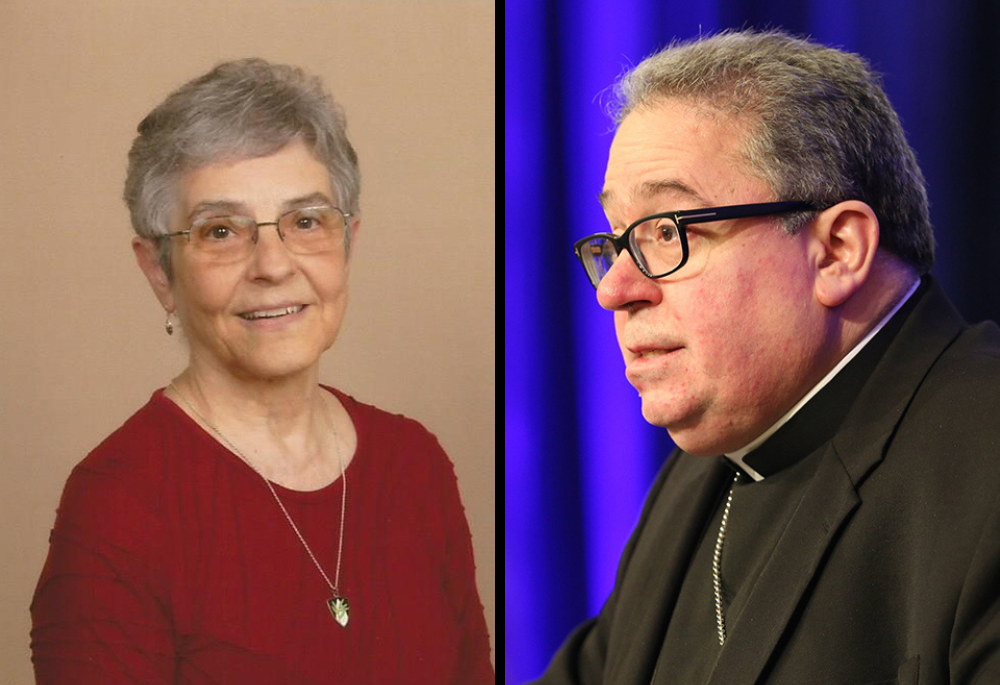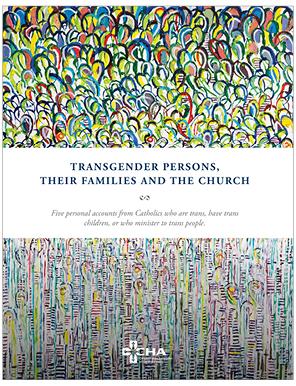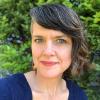
Sr. Luisa Derouen, a Dominican Sister of Peace and Bishop Michael Olson of Fort Worth, Texas (Courtesy photo and OSV News/CNS file/Bob Roller)
At their spring plenary assembly last week, the U.S. bishops voted to begin the process of revising their official directives for American Catholic health care institutions to formally mandate those facilities not provide gender-affirming care to transgender patients.
At the time, one of the bishops told NCR that in making the move, he had consulted with Dominican Sister of Peace Luisa Derouen, a widely respected voice who has ministered among the trans community since the 1990s.
Bishop Michael Olson of Fort Worth, Texas, a member of the bishops' doctrine committee, said the bishops had done "a great deal of listening" on the matter. But, in an interview this week, Derouen contended that Olson had used her name in a misleading manner to buttress the prelates' claims of consulting trans individuals.
Derouen told NCR June 19 she was "very surprised" to see her name mentioned by Olson and that it appeared the bishop "intended to give the impression that he's spoken extensively with trans people and with me."
The sister said she had two interactions with Olson three years ago — during a personal phone call and then a panel organized by the Catholic Health Association — but that the "extent of our conversation was minimal and he was not grasping what I was trying to say."
Advertisement
The U.S. bishops voted on June 16 to align their directives for Catholic health care institutions with a doctrinal note the bishops released in March that focused on what the prelates called the "moral limits to technological manipulation of the human body."
Derouen said while she does not know the extent of Olson's interactions with trans people, the doctrinal note does not reflect what she and several members of the trans community have shared with the bishops.
The note — praised by some and harshly criticized by others — denounces "any technological intervention that does not accord with the fundamental order of the human person as a unity of body and soul." Critics argue it harms the trans community by rejecting that trans people exist, reaffirming points not supported by the latest science and further marginalizing the trans community.
The proposal to adapt the official health care directives to match the doctrinal note was brought forward at the bishops' meeting by Bishop Daniel Flores of Brownsville, Texas, chair of the doctrine committee. Before he formally presented the matter, several bishops urged the committee to consult more broadly as it drafts new portions of the directives.
Speaking to his fellow prelates, Olson said prior to issuing the doctrinal note, committee members not only listened to "members who identify themselves as part of a trans community" but also to theologians, ethicists and family members.
The bishop said what became clear through the consultation process was that "there is still a lack of clarity between what is authentic gender dysphoria and then also the gender ideology that in part is preying upon these people and enhancing their suffering."
Olson declined NCR's request for an interview in response to Derouen's concerns and about the committee's preparation for the doctrinal note. The bishop currently is embroiled in a scandal involving, among other issues, a Carmelite nun accused of breaking her vows of chastity with a priest and charges that Olson responded with overbearing authority over the Carmelites' monastery. The religious community has sued the bishop and the Diocese of Fort Worth.
In 2020, the Catholic Health Association — the largest group of nonprofit health care providers in the country — organized a panel of five Catholics, including Derouen, to give presentations to members of the doctrine committee about transgender people.
Before the gathering, held on Zoom due to the pandemic, Olson initiated a phone call with Derouen. The two spoke for about an hour, according to the sister.
"I give him credit for initiating the call, but at the end of it, I felt he really was not hearing what I was saying and we were not on the same page," she said.
What she was trying to communicate, Derouen explained, was what she has articulated for years: "Transgender people are real, they are not psychotic, they are not following a gender ideology or led by gender ideology," she said. "They are struggling to live and they are trying to live with integrity and honesty."
The two-hour panel meeting included questions from the bishops and presentations by Dr. Colt St. Amand, a transgender man, physician and psychologist; Deacon Ray Dever, a retired environmental engineer with a transgender daughter; Maureen Cauffey, a transgender woman and business owner; and a Catholic mother with a transgender son who opted to keep her identity private.
The panelists' written testimonies later were edited by Dominican Fr. Charles Bouchard, senior director of theology and sponsorship at the Catholic Health Association, and reproduced as a booklet titled "Transgender Persons, Their Families and the Church."

The Catholic Health Association's booklet titled "Transgender Persons, Their Families and the Church."
According to the volume, St. Amand said in his presentation that in recent years, religious leaders of different denominations have claimed that transgender people are trying to separate sex and gender. "Based on my years of study of the science, this is an oversimplification that represents a lack of depth of understanding," he said.
"What the scientific community knows now is that a person's sex is composed of multiple components from their sex chromosomes, gonadal hormones, internal genitalia, external genitalia, and gender identity, which some refer to as brain sex."
In the volume, Dever, the permanent deacon with a transgender daughter, said he understood the church's concern with gender ideology but that he has "personally seen no evidence of any connection between gender ideology and authentically transgender individuals."
"It became self-evident to us, from our experience, from the experience of others, and from the technical literature, that there clearly are biological and psychological factors at work that cause someone to be transgender," Dever said. "Anyone with any significant firsthand knowledge of transgender individuals would be baffled by the suggestion that transgender people are somehow the result of an ideology of gender."
The deacon said he had found an "overwhelming consensus" among major medical and psychiatric organizations that "transgender people are real" and that transition-related medical treatments "are effective and medically necessary."
Derouen told NCR that based on the doctrinal note, she believes "the panel didn't seem to be all that helpful to the committee. They are still denying that transgender people exist."
"Three years later they've come out with a note that certainly doesn't reflect what we communicated to them," she said.
Cardinal Daniel DiNardo of Galveston-Houston prepares to vote June 16 during the U.S. Conference of Catholic Bishops' spring plenary assembly in Orlando, Florida. (OSV News/Bob Roller)
"No ministry has shaped my life the way this has. Transgender people have made me a much better woman and a much better Catholic."
— Sr. Luisa Derouen
Interventions to alter the body "for what is termed 'gender dysphoria' or 'gender incongruence,' " are "not morally justified," says the doctrinal note. Such interventions "do not respect the fundamental order of the human person as an intrinsic unity of body and soul, with a body that is sexually differentiated."
Pope Francis, who has met with transgender individuals on a number of occasions, is quoted several times in the doctrinal note and has called gender ideology "evil" and "one of the most dangerous ideological colonizations."
Derouen said she was relieved to hear members of the doctrine committee suggest during the bishops' meeting that they will not rush revisions to the ethical directives.
"The Holy Spirit is alive in the church," said the sister, "and will guide us through new learnings of medical science, the experience of trans people and the development of doctrine on all issues of sexuality. The development of doctrine is firm church teaching, after all, and this is how it happens."
Derouen added that over the past two decades, she has witnessed "transgender individuals' resilience, their courage, their patience, their integrity."
"No ministry has shaped my life the way this has," she said. "Transgender people have made me a much better woman and a much better Catholic."




